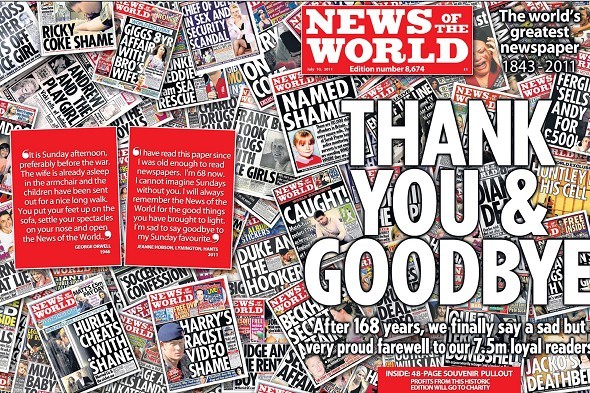By now you have probably heard about the phone hacking scandal that has swept across the United Kingdom and shut down the world’s most popular English-language paper: the News of the World. With a circulation of some 2.6 million, the 168-year-old News of the World dwarfs papers like The New York Times and the Guardian, and only really stands up against other populist tabloids like the Daily Mail and The Sun.
The current state of play suggests that phone hacking was just the tip of the iceberg, with corrupt salaciousness running deep into the British media, parliament, and police. Perhaps more importantly, though, the problem of phone hacking almost certainly isn’t restricted to just the UK: News of the World is owned by News Corporation, and News Corp owns huge swaths of the worldwide film, television, and print industries. Most notably, News Corp owns the Fox TV network in the US — and if it turns out that phone hacking also took place on US soil, then it might be time for Murdoch to bow out, or at least don a sou’wester as the shit hits the fan.
The ironic thing is that these papers — and indeed most commercial interests, media or otherwise — exist for the sole purpose of pleasing and fulfilling you the reader, you the consumer, and you the judge and jury.
It’s not like the News of the World enjoyed hacking the voice mail inboxes of celebrities, bigwigs, and victims of various crimes and atrocities. The editors and journalists might have shared a few smug grins at the prospect of securing yet another devastatingly awesome exposé, but I doubt they relished the actual hacking, the actual law breaking. It was simply a means to an end; a really dirty one, but all they really wanted was millions of gaping mouths and bulging eyeballs and acres of advertising space sold — and that’s exactly what they got.
You bought the paper. You saw the headline and picked it out and plunked down £1 on the counter.
These papers (and websites and TV networks) only exist because you buy them — and we buy them because the stories they tell and the disgusting truths they uncover are music to our ears. I find it hard to get my head around it, but we humans actually enjoy reading the details about a raped teenager’s last moments on Earth, or the depraved excesses of D-list celebrities.
Maybe enjoy isn’t quite the right word, but the fact is that the News of the World, which basically existed for the sole purpose of publishing carnal celebrity and political scoops, was the most-read paper in the country. As long as we buy the paper, the publisher is certainly going to keep printing it — if capitalism has taught us anything… — and if we’re not reading the stories for pleasure or at least schadenfreude, then there’s only two other options: the seeking of knowledge, or the endemic, enduring, and enforced urge of an ailing culture.
 I think, in most cases, people consume media of all varieties to inform themselves; to learn about something that you probably won’t experience in your day-to-day life. We read autobiographies because we want to see the world through eyes that are different from our own; how the world sparkles for the rich and famous, how the world stinks for the utterly abject, and how the world is full of magic and for those who have traveled from rags to riches. We read fictional books and watch fictional television shows and movies for much the same reason — to explore strange, new worlds that we won’t visit in our own lifetime — and music… music takes us to another realm entirely.
I think, in most cases, people consume media of all varieties to inform themselves; to learn about something that you probably won’t experience in your day-to-day life. We read autobiographies because we want to see the world through eyes that are different from our own; how the world sparkles for the rich and famous, how the world stinks for the utterly abject, and how the world is full of magic and for those who have traveled from rags to riches. We read fictional books and watch fictional television shows and movies for much the same reason — to explore strange, new worlds that we won’t visit in our own lifetime — and music… music takes us to another realm entirely.
Newspapers are an odd one. Some people read them just to pass the time, and certainly some people read papers like The Independent and The Washington Post to be informed about the world and the state of global culture. If circulation figures are anything to go by, though, people mostly read papers and magazines to find out about the current state of society. At a glance, this isn’t such a bad thing. If it wasn’t for magazines, women wouldn’t have an easy way to find out the latest fashion in clothes and makeup and sex positions. If it wasn’t for tabloids, men would be left floundering at the pub, unable to discuss the latest football developments or the flavour-of-the-month starlet.
The discussion about culture versus society is best left for another day, though. You can not objectively state that tabloids are inherently bad — and likewise, you’d be crazy to think that your snooty broadsheet paper is somehow better than The Sun or Hello!; they’re just different. You with your fancy libertarian paper might know the finer details about the Syrian uprising — but do you know what colour nail polish Jennifer Lopez uses, or who her current boyfriend is? Who’s to say which nugget of information is intrinsically more useful? Does the intelligent reader actually care about Syria, or is he just reading about Syria because his friends are reading about Syria? Is he seeking knowledge, or is he the result (victim?) of societal peer pressure?
So where do we go from here? Is it as simple as “voting with our pockets” and eschewing one media source for another? You could shut down every tabloid — but would that ‘cure’ society as the unwashed masses reach for a broadsheet and experience their first polysyllabic words, or would tabloid content merely leak into other publications?
I wonder what would happen if we turned off the media tap entirely. I strongly doubt it would be a good thing — everyone would have to start talking on trains, ugh! — but we would be able to find out whether we perpetuate this vicious feedback loop of feeding the bloodied, baying masses with gossip and sex and scandal, or whether we merely buy into an ideological construct created by crafty media moguls like Murdoch.




















